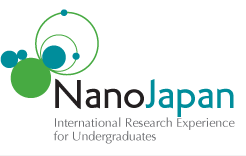

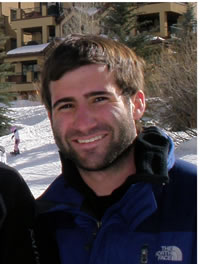
Why NanoJapan?
Participating in NanoJapan was an amazing opportunity for me to step outside of my normal comfort zone and experience life and research in a country with a culture very different from my own. Participating in research in Japan was a great way to get a better perspective of both life in the lab, as well as a new way to look at the way things work back at home. Recently, with research becoming increasingly internationally oriented it is become ever more important to have an understanding of other scientist's backgrounds and methods as collaborations are pursued.
Sadly, science and engineering students can not easily pursue study abroad opportunities despite the importance placed on modern researchers to be internationally oriented. The NanoJapan program is both a step in the right direction and the perfect opportunity for a student to gain research experience, and knowledge while also getting the opportunity to experience life in another country. The fact that it takes place during the summer means that students do not have to worry about missing a semester of coursework, and yet still obtain a study abroad experience. I chose the NanoJapan program precisely for this reason, and I am thankful that I did for I feel much better understanding towards academic research, life in a foreign country, and what goals I have for my future. I plan on further pursuing international education and research opportunities, and I am continuing my Japanese studies in hope that I can return to Japan sometime in the future.
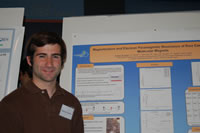
Andrew Gomella Presents at the 2009 RQI Summer Research Colloquium
Andrew Gomella gave a poster presentation on Magnetization and Electron Paramagnetic Resonance of Rare Earth Based Molecular Magnets at the 2009 RQI Summer Research Colloquium. To view his poster and abstract click here.
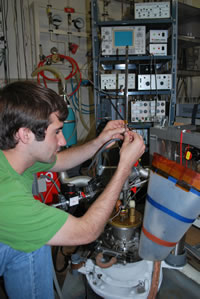
Research Internship Overview
My internship was definitely a very enlightening experience. This was the first time I had ever conducted research on a topic such as Single Molecule Magnets, or simply done investigative research. At first I was overwhelmed and confused by the experiments and analaysis we were doing, but I soon learned to both understand and appreciate it. It was fairly exciting to study a sample for the first time, knowing that no one else has ever done what we were doing with these particular compounds.
I would stress that in my lab I had to be very independent, and proactive about my research. I found that after the first experiment (which had to be conducted with senior lab members due to the sensitivity and difficulty of using the equipment) I was basically just given the data and told to analyze it. In all honesty I had no idea how to do this, and I felt like they expected I knew already. I had to be adamant about getting help from my labmates about how to go about processing the data. I felt like I was being fairly annoying at times, especially when trying to understand how to analyze ESR curves by someone who only has a moderate grasp of the English language. I learned to get used to this and spend a fair amount of time researching online to get the information I needed. I wish I had come more prepared for this task. If I had had some practice analyzing ESR data and magnetization curves before coming to Japan I would have felt much more comfortable the first few weeks in the lab.
The most difficult part about researching in an international environment was overcoming the language barrier and misunderstandings due to it; often due to difficulty in picking up on the “implied statements” which the Japanese are so famous for. Often I felt they expected me to do something or know something without actually saying anything to me. I had to adapt to this and be very proactive about figuring what exactly I needed to be doing. I feel like I am much better at working with a wide variety of personality types now that I have accomplished this. Many issues I experienced with research prior to NanoJapan seem very trivial compared to some of the challenges I had to face while in my lab in Sendai. My labmates were definitely very understanding and helpful though, and it went as well as I could have hoped. I learned so much about research, physics, as well as social interactions between cultures.
The research I conducted relates very closely to my academic interests, and definitely helped me develop more curiosity about Quantum Mechanics, a class I am taking during my fall semester back at school. I am also continuing research back at my University, though sadly there is no nanotechnology related research here. Hopefully I will find more opportunities in the near future to conduct further work in nanotechnology.
Daily Life in Sendai
I would wake up at around 8am and then get ready to go to my research lab. Then I would take a short bike ride, about 10 or 15 minutes, to the lab; sometimes stopping to get a small breakfeast from a conbini. Then, if it was a Monday, Wednesday, or Friday I would usually begin my day with an hour long Japanese lesson. On other days I would go to my office and start work on analyzing data on my laptop, which was provided my university. In the late morning, Precious and I would have a shared Japanese culture lesson for about 30 minutes in which we would usually drink tea and learn something about Japanese culture. Then I would have a one hour Japanese language lesson with one of the volunteer Japanese teachers.
I would have lunch at the school cafteria, which is just a block from the lab, either with some labmates or by myself. After this I would get back to work in the office, or if it was one of the days where we were doing an experiment I would return to the main lab room. On these days we would usually prepare the cryostat for the experiment in the morning, and then perform the measurments all afternoon and sometimes into the night.
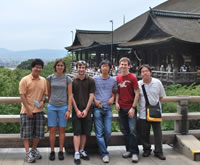
With fellow NanoJapan 2009 students in Kyoto
On weekends I would try my best to travel as much as I could. My JR East Pass and JR pass came in handy for this. Sometimes I would travel pretty far, such as Hakodate, just for a night and othertimes I would explore around Sendai on my bike. I would also take daytrips to nearby places, such as Yamadera and Matsushima.
My “dorm” in Sendai was fairly nice though our housing was the most expensive of all NanoJapan students this summer. The room was great, with a nice bed and private bathrooms. My only complaint would be that breakfeast and dinner was included with the price, and while this was nice, I often missed the scheduled dining times. Not to mention eating dishes like tororo was something I couldn't handle. Besides this though, most of the dinners I had at the dorm were fairly good. Buying a bike can be useful because it makes getting around so much easier and Japan is very bike friendly in general. Its even better if you have a labmate who will let you borrow one because it can be difficult to find somewhere to sell it back to at the end of the internship. I didnt realize until about halfway through my internship, but there is a huge underground food court/ food stall area underneath Sendai Station called S-pal. They have just about every type of food you could imagine, and most of it is “to go”. It is a great place to explore for different types of food, and to try some new things.
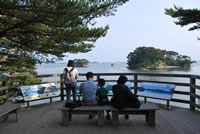
Japanese Family Sightseeing in Matsuhima Bay
My Favorite Experience in Japan was ...
meeting random Japanese people during my travels.
Before I left for Japan I wish I had ...
studied more in-depth to better prepare for my research project.
While I was in Japan I wish I had ...
made more Japanese friends.
Tips for Future NanoJapan Participants